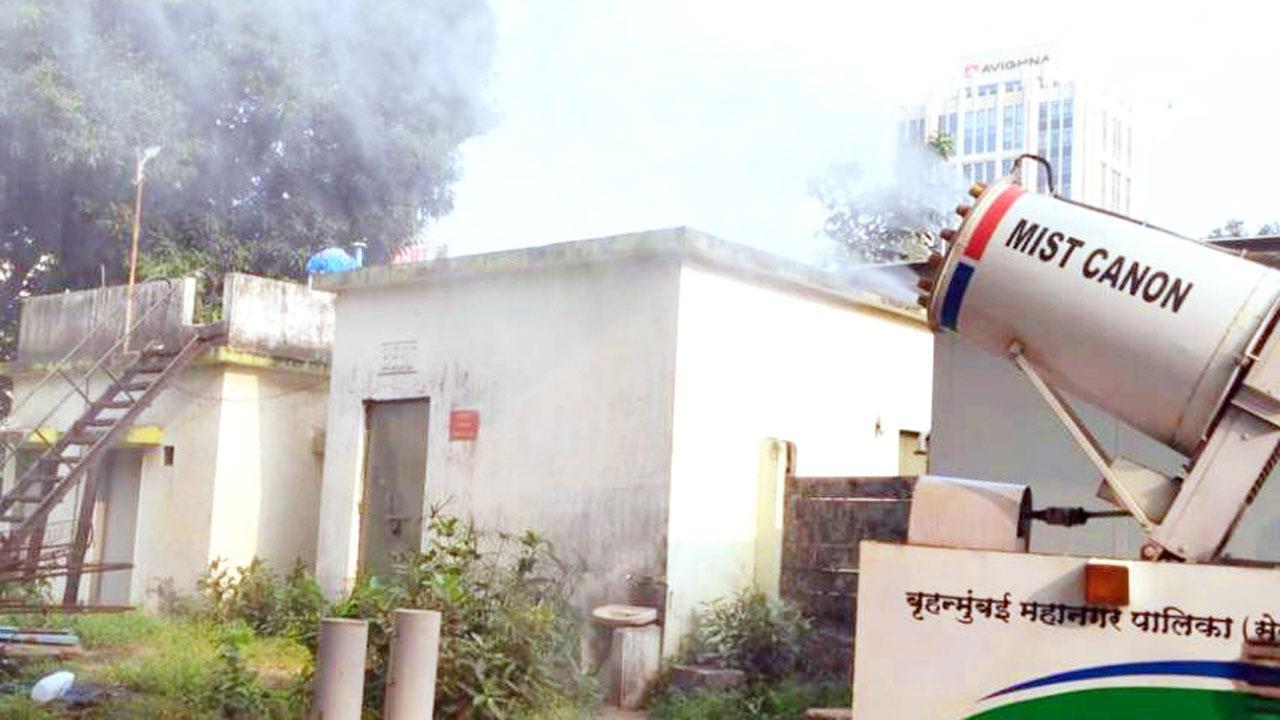While water tankers are covering 350-400 km of roads, misting cannons help civic staff cover another 150 km of roads; civic officials doubtful about meeting target with current infra

The BMC increased the number of misting machines, which require much less water to spray water and settle the dust
Key Highlights
- A month and a half after launching the exercise, the BMC has not achieved its daily target
- The mist cannons, however, have helped it cover 500 km of roads
- Washing roads is one of the BMC’s measures to tackle air pollution
A month and a half after launching the exercise to wash at least 650 km of roads daily to mitigate air pollution, the Brihanmumbai Municipal Corporation (BMC) has not achieved its daily target. The mist cannons, however, have helped it cover 500 km of roads.
Washing roads is one of the BMC’s measures to tackle air pollution. It has issued anti-dust norms for building contractors and served notices to errant ones, it removed furnaces and has considered setting up air filters on vehicles. Of the total 2,050 km of roads in the city, it aimed to wash 650 km daily so that each road is washed at least every three days. Its next target was to wash 1,000 km of roads daily to reduce the interval between every wash to two days.
However, water tankers deployed by the BMC are able to cover only 350 km to 400 km of roads daily. The BMC increased the number of misting machines, which are able to cover 150 km of roads every day. The mist cannons help settle dust particles in the air onto the roads. “We have asked civic wards to increase the distance of roads covered and the number is rising daily. In addition to that, misting machines are doing a good job of settling the dust with very little water. We are able to cover 500 km of roads for dust mitigation every day,” a BMC official said.
Wards wait for funds
“We try to cover as much distance as possible but the roads are empty for only a few hours. It may not be possible to cover one third of a ward every day with the infrastructure available,” said a ward officer. He added that wards have not received funds to wash roads yet. The civic commissioner had approved in principle the approximate cost of Rs 13 crore to clean 650 km of roads daily for four months. “If this amount is not sufficient, wards will demand more funds,” said an official.
According to a civic report, on Wednesday, December 6, the civic body washed 348 km of road using 8.47 lakh litres of water. An average of 2,500 litres of water was used per km of road. The quantity of water required to wash roads is also a concern. It varies between 2,000 litres and 3,500 litres per km for each ward. On Wednesday, K West ward washed 26 km of roads with 1.10 lakh litres of water, whereas P West ward used 1 lakh litres of water to wash 21 km of roads.
“Roads with wide footpaths and large widths require more water than narrow gullies. The water is being drawn from borewells and not from wells with potable water,” said an official. The report adds that around 153 km of city roads were misted on Wednesday by using just 6,253 litres of water, with an average of 41 litres of water used per km.
‘Pointless exercise’
Former corporator and opposition leader, Ravi Raja, said that washing roads is not the solution. “The BMC is spending crores on washing roads and misting but it won’t help in curbing air pollution. Instead, they should act against the construction sites and force them to follow the rules,” Raja said.
 Subscribe today by clicking the link and stay updated with the latest news!" Click here!
Subscribe today by clicking the link and stay updated with the latest news!" Click here!










